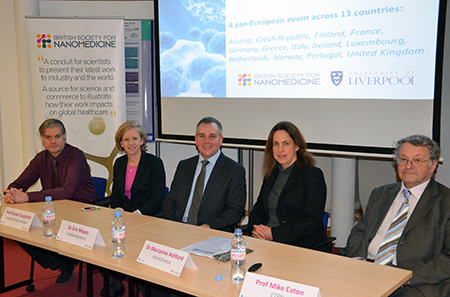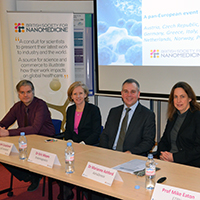 Professor Andrew Owen, Professor Sarah Coupland, Dr Eric Mayes, Dr Marianne Ashford and Professor Mike Eaton
Professor Andrew Owen, Professor Sarah Coupland, Dr Eric Mayes, Dr Marianne Ashford and Professor Mike Eaton
Ground-breaking technology that can significantly improve cancer treatment was discussed across 13 European countries on Friday (31 January) as part of Nano World Cancer Day, with Liverpool hosting the UK event.
Nanomedicine is an emerging field of drug development which utilises particles at the nano scale (one millionth of a millimetre). These are being developed by scientists at the University, and elsewhere, to reduce the side-effects of cancer treatment and improve how effectively drugs target tumours.
New treatments
Experts from across the UK were at the event to talk about the very latest research in the field. They included Dr Marianne Ashford, Principal Scientist for Drug Targeting at AstraZeneca who spoke about new treatments. Conventional treatments flood the body with toxic drugs – of which as little as 0.001% reaches the tumour.
Nanomedicines being developed by AstraZeneca are able to penetrate more selectively into cancerous cells, meaning that the drugs target parts of the body that are affected by the disease.
Nano World Cancer Day was organised by the European Technology Platform for Nanomedicine (ETPN) and took place simultaneously in 13 countries across the EU. The UK node was co-ordinated by the British Society for Nanomedicine. Professor Mike Easton from the ETPN attended the event in Liverpool to highlight the importance of researchers working with industry to develop a market that is worth €130bn.
Aside from the financial potential of nanomedicines, it is the impact on public health that is driving the growth of research in this area. The University’s Professor Sarah Coupland, a specialist in molecular and clinical cancer medicine, told the audience that cancer is now the biggest killer in Europe overtaking cardio-vascular illness in the last few years.
Improving safety
Professor Andrew Owen from the University is also Chair of the British Society for Nanomedicine. He said: “Nanomedicine is about improving the safety of drugs for patients. Medicines that can reduce side-effects and the need for surgery promise to radically change how we treat cancer in the next few years.
“Nano World Cancer Day demonstrated how scientists across Europe are working to make this future a reality.”
More information about Nano World Cancer Day can be found at the ETPN website. Join the British Society for Nanomedicine through the BSNM website.
